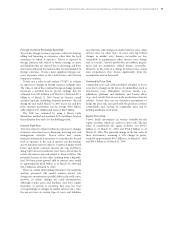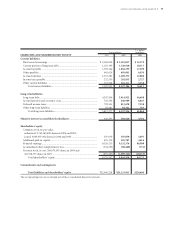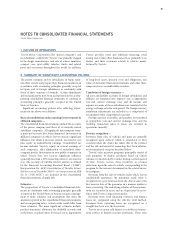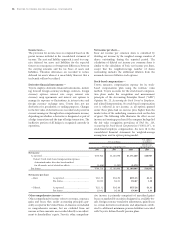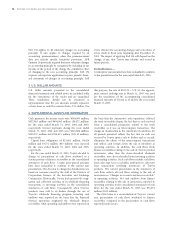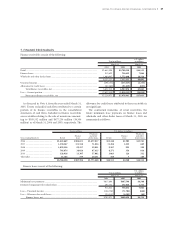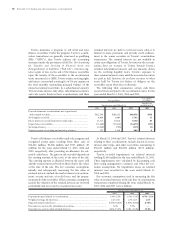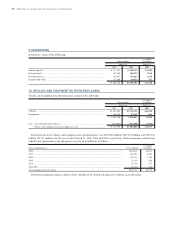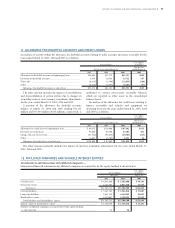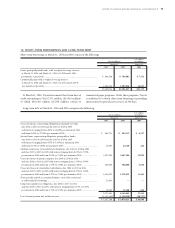Toyota 2005 Annual Report Download - page 87
Download and view the complete annual report
Please find page 87 of the 2005 Toyota annual report below. You can navigate through the pages in the report by either clicking on the pages listed below, or by using the keyword search tool below to find specific information within the annual report.
NOTES TO CONSOLIDATED FINANCIAL STATEMENTS >85
Accounting changes—
In September 2004, the Emerging Issues Task Force
(“EITF”) reached consensus on the disclosure provisions
in its Issue No. 03-1, The Meaning of Other-Than-
Temporary Impairment and Its Application to Certain
Investments (“EITF 03-1”) for investments accounted for
under FAS No. 115, Accounting for Certain Investments in
Debt and Equity Securities, and FAS No. 124, Accounting
for Certain Investments Held by Not-for-Profit Organizations.
See Note 6 for disclosures required by those provisions.
Recent pronouncements to be adopted in future periods—
In November 2004, the Financial Accounting Standards
Board (“FASB”) issued FAS No. 151, Inventory Costs—an
amendment of ARB No. 43, Chapter 4 (“FAS 151”). FAS
151 amends the guidance in ARB No. 43, Chapter 4,
“Inventory Pricing,” to clarify the accounting for abnor-
mal amounts of idle facility expense, freight, handling
costs, and wasted material (spoilage). Paragraph 5 of ARB
43, Chapter 4, previously stated that “. . . under some
circumstances, items such as idle facility expense, excessive
spoilage, double freight, and rehandling costs may be so
abnormal as to require treatment as current period
charges. . . .”. FAS 151 requires that those items be
recognized as current-period charges regardless of
whether they meet the criterion of “so abnormal.” In
addition, this Statement requires that allocation of fixed
production overheads to the costs of conversion be based
on the normal capacity of the production facilities. FAS
151 is effective for inventory costs incurred during fiscal
years beginning after June 15, 2005. Management does not
expect this statement to have a material impact on
Toyota’s consolidated financial statements.
In December 2004, FASB issued FAS No. 123(R), Share-
Based Payment (revised 2004) (“FAS 123(R)”). FAS 123(R)
is a revision of FASB Statement No. 123, Accounting for
Stock-Based Compensation (“FAS 123”), supersedes APB
Opinion No. 25, Accounting for Stock Issued to Employees
(“APB 25”), and its related implementation guidance. FAS
123(R) requires a public entity to measure the cost of
employee services received in exchange for an award of
equity instruments based on the grant-date fair value of
the award. That cost will be recognized over the period
during which an employee is required to provide service
in exchange for the award. FAS 123(R) also requires a
public entity to initially measure the cost of employee
services received in exchange for an award of liability
instruments based on its current fair value; the fair value
of that award will be remeasured subsequently at each
reporting date through the settlement date. Changes in
fair value will be recognized as compensation cost over
that period. Although Toyota is required to implement the
standard as of the beginning of the first interim or annual
period that begins after June 15, 2005 under Statement
No. 123(R), the Securities and Exchange Commission has
amended the compliance date and Toyota is required to
adopt the Standard for the year ending March 31, 2007.
Management does not expect this statement to have a mate-
rial impact on Toyota’s consolidated financial statements.
In December 2004, FASB issued FAS No. 153, Exchanges
of Nonmonetary Assets — an amendment of APB Opinion
No. 29 (“FAS 153”). The guidance in APB Opinion No. 29,
Accounting for Nonmonetary Transactions, is based on the
principle that exchanges of nonmonetary assets should be
measured based on the fair value of the assets exchanged.
The guidance in that Opinion; however, included certain
exceptions to that principle. FAS 153 amends Opinion 29
to eliminate the exception for nonmonetary exchanges of
similar productive assets and replaces it with a general
exception for exchanges of nonmonetary assets that do
not have commercial substance. A nonmonetary exchange
has commercial substance if the future cash flows of the
entity are expected to change significantly as a result of the
exchange. FAS 153 is effective for nonmonetary asset
exchanges occurring in fiscal periods beginning after June
15, 2005. Management does not expect this statement to
have a material impact on Toyota’s consolidated financial
statements.
In March 2005, FASB issued the FASB Interpretation
No. 47, Accounting for Conditional Asset Retirement
Obligations — an interpretation of FASB Statement No. 143
(“FIN 47”). This Interpretation clarifies that the term
conditional asset retirement obligation as used in FASB
Statement No. 143, Accounting for Asset Retirement
Obligations, refers to a legal obligation to perform an asset
retirement activity in which the timing and (or) method of
settlement are conditional on a future event that may or
may not be within the control of the entity. FIN 47
requires a company to recognize a liability for the fair
value of a conditional asset retirement obligation if the fair
value of the liability can be reasonably estimated. The fair
value of a liability for the conditional asset retirement
obligation should be recognized when incurred. FIN 47 is
effective no later than the end of fiscal years ending after
December 15, 2005. Management does not expect this
statement to have a material impact on Toyota’s consoli-
dated financial statements.
In May 2005, FASB issued FAS No. 154, Accounting
Changes and Error Corrections — a replacement of APB No.
20 and FAS No. 3 (“FAS 154”). FAS 154 replaces APB
Opinion No. 20, Accounting Changes, and FASB Statement
No. 3, Reporting Accounting Changes in Interim Financial
Statements, and changes the requirements for the account-
ing for and reporting of a change in accounting principle.


